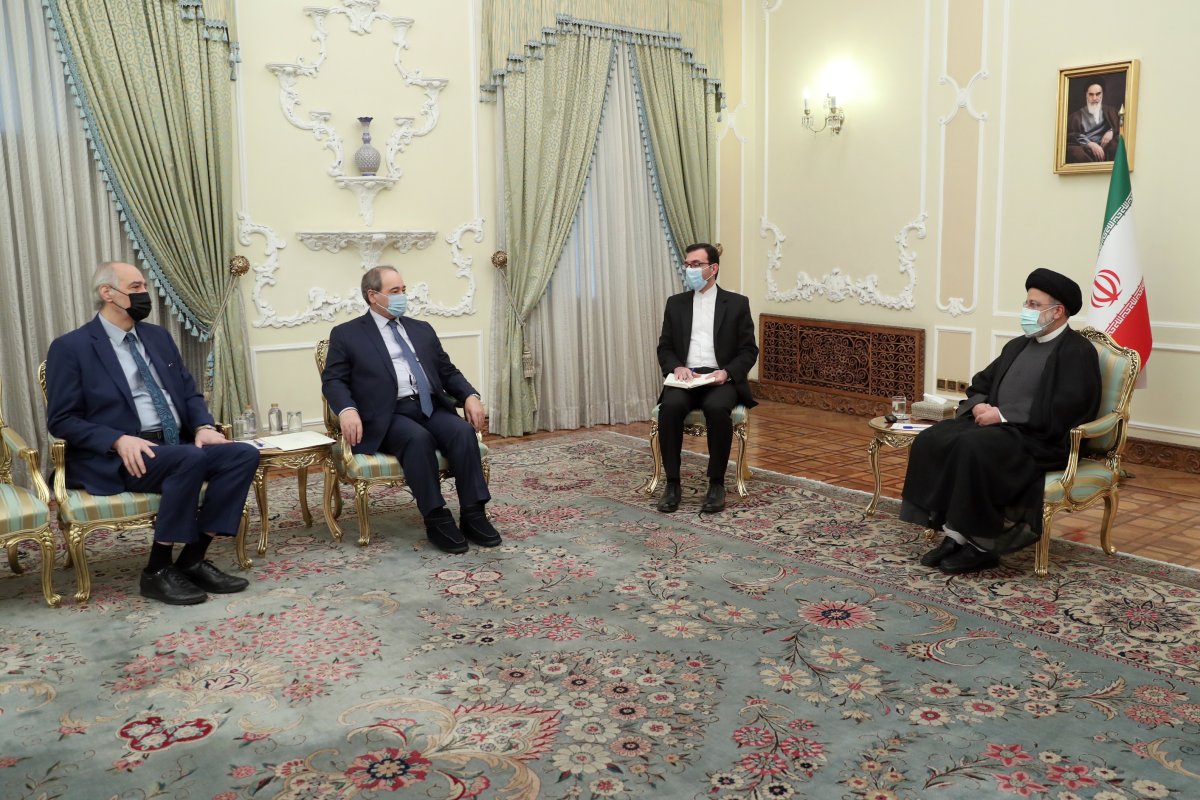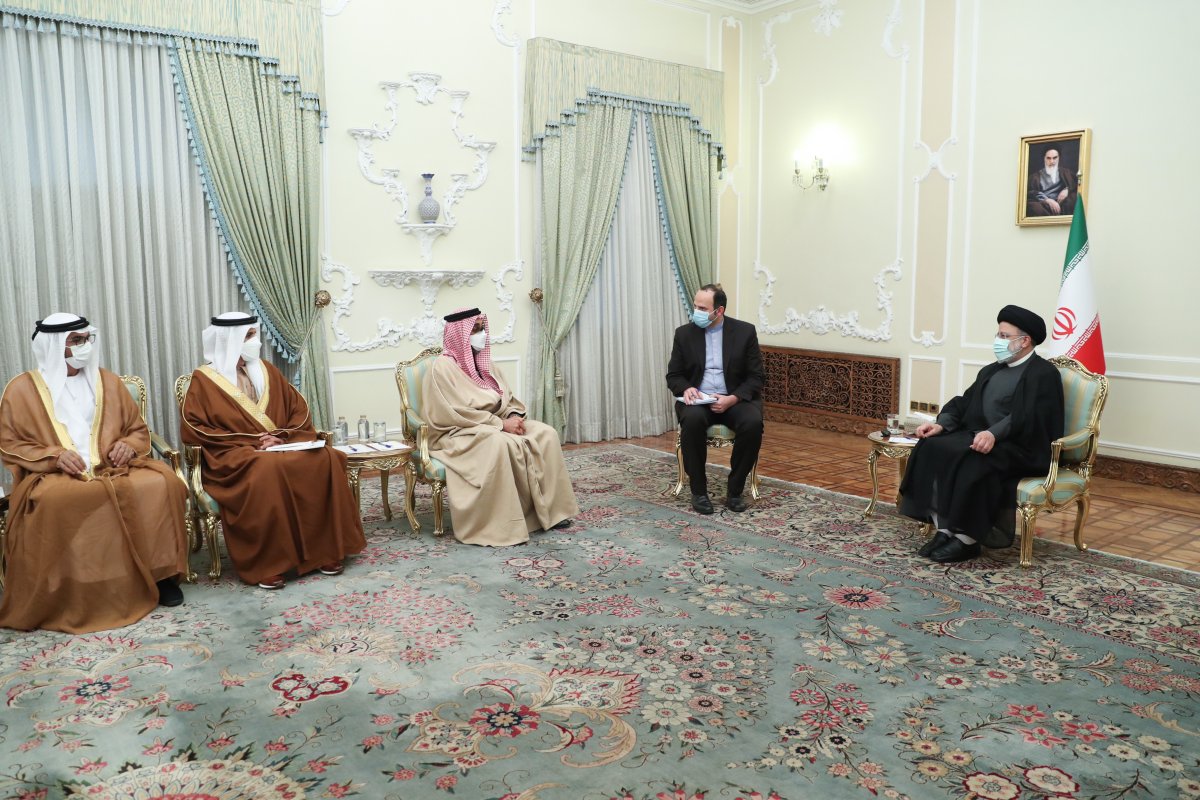Syria has accused Israel of conducting a new round of airstrikes just as the Arab country's top diplomat joined a senior official of the United Arab Emirates in Iran.
Reports emerged Monday, early Tuesday local time, of explosions heard near the port city of Latakia and local state-run media outlets began to broadcast evidence of an air raid in the area. The Syrian Defense Ministry then confirmed the attack.
"At around 1:23 in the morning today, the Israeli enemy carried out an aerial aggression with several missiles from the direction of the Mediterranean, southwest of Latakia, targeting the container yard in the commercial port of Latakia," the ministry said. "The aggression led to the burning of a number of commercial containers in the aforementioned place, and there were no casualties."
Israel, which routinely declines to comment on such reports, did not issue a statement and the Israel Defense Forces told Newsweek that "the IDF does not respond to foreign reports."
Israeli officials have in the past, however, acknowledged conducting hundreds of strikes against Syria, targeting positions suspected of being linked to Iran, as well as Syrian air defense systems attempting to defend the country's airspace.
The latest incident came as Syrian Foreign Minister Faisal el-Mekdad was in Tehran for a two-day visit coinciding with a trip to the Iranian capital by UAE national security adviser Sheikh Tahnoon bin Zayed Al Nahyan. Iran is an ally of Syria and has supported the country in its decade-long civil war, while the UAE initially backed the opposition but later cast support to the government and has intensified this support in recent years.
The UAE also established relations with Israel last year as part of a landmark normalization agreement alongside Bahrain, later joined by Sudan and Morocco. Syria remains technically at war with Israel, which continues to occupy the Golan Heights in the country's southwest, and a feud between Iran and Israel has led to shadowy tit-for-tat attacks across the region.
Sitting beside Mekdad, Iranian President Ebrahim Raisi said Monday that, "today, Syria is at the forefront of resistance against the Zionists with its anti-Zionist approach and the history of the resistance of Syrian people and government against cowardly aggression will be proudly recorded," according to his office.
He stated that "long-term, comprehensive planning should be done to develop and deepen relations between Tehran and Damascus," including in the field of trade, and condemned the ongoing U.S. military presence in Syria and elsewhere in the region as "a great damage to security, stability and peace of peoples."

Mekdad, for his part, expressed gratitude to Iran and his country's other major ally, Russia, for their support, ensuring that "the plans that targeted Syria militarily failed and did not achieve their goals." He said that Damascus' foes had, "therefore, resorted to the weapon of besieging Iran and Syria and imposing unilateral coercive measures on their peoples."
Damascus and Tehran are both subject to U.S. sanctions, which have disrupted the economies of the two powers.
Speaking alongside his Iranian counterpart Hossein Amir-Abdollahian, Mekdad lashed out at Israel's ongoing attacks as well, saying "the continued Israeli aggression against Syria cannot pass without a response."
Mekdad also met Monday with Iranian Parliamentary Speaker Mohammad Bagher Ghalibaf to discuss "strengthening cooperation and coordination between the parliaments of the two countries at the regional and international levels." Qalibaf echoed these points, recalling his own visit to Syria in June, according to the official Islamic Consultative Assembly News Agency.
And while Tehran and Damascus have long boosted their cooperation, Sheikh Tahnoon's visit from Abu Dhabi marked the latest in what appeared to be a regional trend toward reconciliation among regional powers.
"There should be no obstacle in the relations between the two Muslim countries of Iran and the UAE, and these relations must not be influenced by the outsiders," Raisi was quoted by his office as saying during his meeting with Sheikh Tahnoon.
He warned that "the policy of the enemies of regional countries is to create fear among the neighbours, but this conspiracy will be thwarted with common wisdom and understanding," and here, too, he criticized Israel, arguing that "the Zionists in the region are pursuing their sinister goals and wherever they can find a foothold, they will turn it into a tool for expansionism; therefore, regional countries should be careful."
Raisi also noted the common interests of the two nations, saying that "the security of the countries of the region is intertwined and Iran supports the security of the Persian Gulf littoral states."
The Iranian president's office quoted Sheikh Tahnoon as saying that "we are the children of this region and we have a common destiny, so the development of relations between the two countries is on our agenda" and "these meetings will be a turning point in the relations between the two countries."
"We are ready to develop cooperation and we hope that a new chapter of relations between the two countries will begin with the visit of Ayatollah Raisi to the UAE," Sheikh Tahnoon was quoted as saying, extending an official invite to the Iranian president.
The meeting comes as Raisi, who came to office in August, continues to pursue a campaign of strengthening Iran's regional relations. Tehran's ties with the monarchies of the Arabian Peninsula have often been strained due to these countries' close partnerships with the United States, their support for groups opposed to Iran across the region and their concerns regarding Iran's nuclear program.
Iranian officials have maintained that nuclear enrichment has always been for peaceful purposes, but agreed in 2015 to join a historic nuclear deal alongside top powers of the U.S., China, France, Germany, Russia and the United Kingdom to curb nuclear production in exchange for sanctions relief. Then-U.S. President Donald Trump abandoned the accord in 2018 and imposed tight economic restrictions that remain in place as President Joe Biden's administration attempts to negotiate a return to the agreement.
While Israel remains opposed to any revival of the nuclear agreement, Arab powers such as the UAE have softened their approach and sought to improve relations with Iran, while at the same time fostering a newfound official relationship with Israel. Simultaneously, the UAE has looked to bring Syria back into the Arab League and conveyed vocal support for Syrian President Bashar al-Assad, who remains blacklisted by the U.S. and most Western countries over allegations of human rights abuses.
Last month, UAE Foreign Minister Abdullah bin Zayed Al Nahyan became the most senior Emirati official to visit Syria since the outbreak of the war. During a press conference in Tehran, Mekdad called the move "a courageous step and an advanced one."
"We are looking to these visits with optimism and we are looking forward to these kinds of initiatives increasing in the coming days and weeks," he added.

Uncommon Knowledge
Newsweek is committed to challenging conventional wisdom and finding connections in the search for common ground.
Newsweek is committed to challenging conventional wisdom and finding connections in the search for common ground.
About the writer
Based in his hometown of Staten Island, New York City, Tom O'Connor is an award-winning Senior Writer of Foreign Policy ... Read more
To read how Newsweek uses AI as a newsroom tool, Click here.








